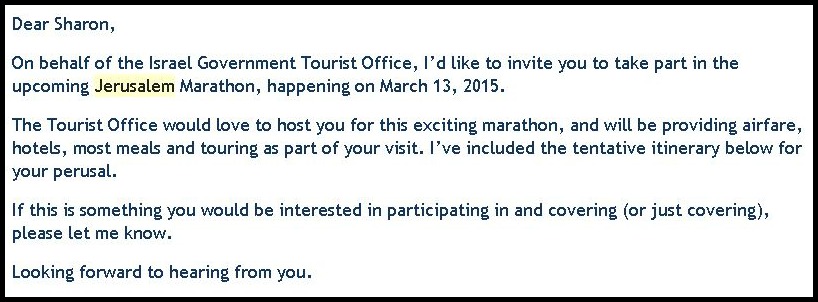This jet lag stuff is no joke! Yesterday (my first morning back in the States) I woke up feeling nauseous and dizzy, and I had a pounding headache. I felt much better this morning, but I was wide awake by 5:00 a.m. (11:00 a.m. Israel time). Thank goodness it’s spring break, so the kids and I don’t have to stick to a schedule, and they’re being very sweet about letting me recover. (Also bribery can be an effective parenting tool.)

Anyway, I have lots to tell you about the Jerusalem Marathon and my week in Israel, but first I want to put things in context by telling you a bit about how I got there.
Let’s back up to early February. I’d been training for a marathon since last July, but because of various setbacks, I was on the fence about whether I’d run a full or half marathon on February 15. I’d run ZOOMA (a half marathon) on January 17, and I had a great 14 mile training run on January 31. But I hadn’t gotten in a longer (17-18 mile) run, and my weekly mileage was too low. It was starting to become pretty obvious that a full marathon was not going to happen for me in two weeks.
Then on February 3, this happened:

If we put aside the utter mind-blowing-ness of this email for a minute and stick with the subject of marathon training…well, this was my second chance. I could run the Donna half AND still manage to run a winter marathon. I wasn’t ready to run a February marathon, but a March marathon? Maybe.
I emailed the Jacksonville Galloway program director, Connie, and asked for her input about my training. Here’s what she recommended:
Four weeks is short but no time goal helps you. You need to prepare to potentially hurt a bunch afterwards but it can be done. I’d like to see you do do the half this weekend and see if you can get in another 3 to 6 miles Sunday night, or after the race run down to Beach Blvd and back to the finish line. That would be a 19 mile run which would be plenty for the 4 weeks beforehand. Next week we [the Galloway group] run 5 miles – turn that into 10. The next week run 7, and run 5 the week before the race. Most important will be consistency during the week – at least 2 runs a week in addition to the long run… I also recommend doing shorter intervals – a 1:1 will make the marathon more enjoyable and you’ll end up going faster. You should be prepared to walk some of it if you need to. Don’t be ashamed at walking the last 6 miles. Hope this helps.
So in other words, a March marathon was doable but was going to hurt, quite possibly a lot. Hmmm.
On February 15, I ran the 26.2 with Donna half marathon. (I still owe you a recap, I know.) Connie had recommended that I run another 6 miles after I crossed the finish line. But I didn’t want to. I wanted to hang out in the VIP tent and eat Ruth’s Chris with Kristie. So that’s what I did.

I decided told myself that the extra miles would still count as long as I ran them within 24 hours of the 13.1. So on the 16th I went to the gym with the goal of running 3-6 miles on tired legs. But after two very slow miles, I was done. I almost always take a rest day on the day following a long run, so I wasn’t prepared for how achy and wobbly my legs would feel. Connie had recommended 19 miles, and I did 15 (sort of). But I could make up some miles during the week.
Only I didn’t. I don’t remember why, but I ran a total of 6.81 miles for the entire week. Oops.
The following week I only ran 10.3 miles. So much for long runs and consistency.
That’s when I emailed my PR contact for the Jerusalem Marathon to ask if I was expected to run the full marathon or if I could run the half. Much to my relief, she told me that I could run either. The choice was mine – and I chose the half marathon.
Unlike my decision about whether to run the half or full Donna, this decision was an easy one. I simply wasn’t trained to run a marathon, and I knew it. Besides, running the half would allow me to fully enjoy this beautiful, historic, hilly course I’d been reading about. I wouldn’t be in pain during or after the race. And now that I didn’t have to cram in all those last minute miles, I could spend plenty of time packing, prepping for the trip, and making arrangements and schedules for my husband, who would be on his own with the kids for an entire week.
The one thing I forgot to do was run. I mean, I ran. But not much. Certainly not enough. I averaged about 10 miles a week, and my longest run was only 4 miles. I figured that since I was already trained for a half marathon, a little bit of maintenance would be enough.
I figured wrong. Did I mention the hills?

Next Up: Jerusalem (Half) Marathon Recap

p.s. Check out these great recaps of the Jerusalem Marathon from some of the awesome bloggers & writers who joined me on the trip:
Shut Up + Run: 2015 Jerusalem Marathon Race Report
Dietitian On The Run: Travel Running: Jerusalem (1/2) Marathon 2015
Run Haven: Running The Jerusalem Marathon